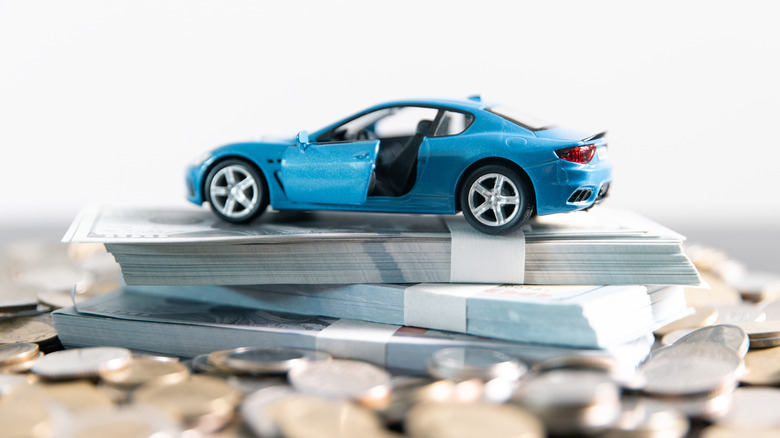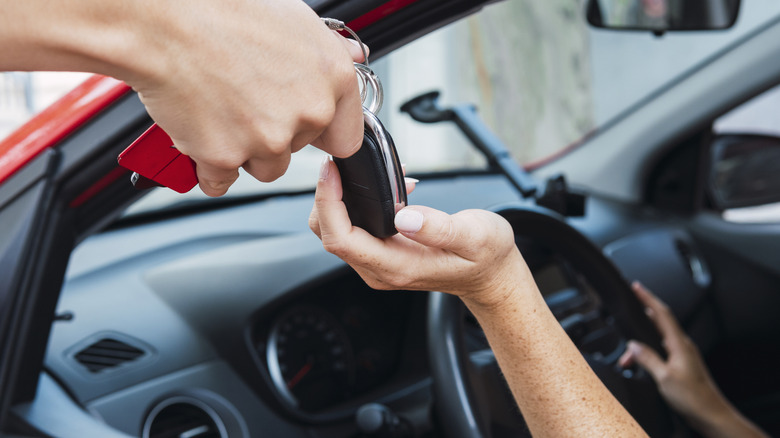Can You Sell A Car That Hasn't Been Paid Off Yet?
Whether you need to move on from an unreliable car or want to drive a vehicle with the latest technology, selling your automobile — even if it's not paid off — is possible. Freeing yourself from this obligation can be a no-brainer or a bit complicated, depending on how you sell the vehicle and financial factors. Car loans are common. According to the Federal Reserve, 80% of new and 38% of used cars are financed. Let's go over some auto financing essentials before diving into the details of selling a car with an existing loan.
The term "paid off" refers to a car loan (or any loan, for that matter) where the borrower has met their responsibility and paid the loan balance, either through monthly payments or a lump sum amount. The lender holds the title and is listed as the lienholder, which gives them legal control over the vehicle until the loan is paid off — even though you possess and use the car. The title is a state-issued document designating who owns the vehicle and is at the heart of the selling process, especially if there's still an outstanding loan.
You can sell a car through a dealer or a private party transaction. Both methods are possible if there's an existing loan balance, but each approach varies in complexity and the steps you'll need to take. We'll cover how each process works and the pros and cons. Regardless of the method, contact the lender to determine how much you owe on the loan. This is called a payoff quote — which can change daily — and is essential for selling a car. Some finance companies will provide a payoff amount that's good for a specific period, often 10 days. You may need a new payoff quote if the time has passed.
Selling to a dealer: the fastest and simplest route
Convenience comes at a price, especially when selling a car. Regardless of whether a local dealer is buying or if you're working through CarMax or Carvana, selling a vehicle in this manner is straightforward, especially if there's a balance on the car loan. The trade-off is you'll usually get less for your car this way than selling privately. Nonetheless, some vehicle owners want to offload their rides without the hassle of Facebook Marketplace, tire kickers, or confusing paperwork. Dealers exist for a reason.
These businesses work directly with finance companies to buy cars with existing loan balances — a regular part of their operations. They'll evaluate your vehicle, in-person or online, and make an offer. Should you proceed, the dealer will confirm the payoff amount with the bank and handle all the paperwork. You'll get paid the difference if the car is worth more than the payoff amount. If you owe more than what the dealer is offering — which is called negative equity — you're responsible for paying the rest. Importantly, the finance company won't sign over the title to the dealer until it has all the money it's owed.
Selling your car through a dealer couldn't be simpler. You'll sign a few forms and can walk away from your vehicle in short order (provided the financial details are taken care of). There's no waiting for the bank to send a lien release or heading to the DMV for a title transfer. While the dealer handles most of the process, it can still take a few business days for the lien to clear and the title to transfer, depending on your state and lender.
Selling privately: better price, more complexity
Selling your car privately is more likely to net a higher price than through a dealer. You'll just need to go through more steps, which is the biggest disadvantage, particularly if the loan hasn't been paid off. It's best to tell buyers the lender holds the vehicle title, and the sale proceeds will go toward paying off the loan. Scam concerns may turn some buyers off, but it prevents surprises. Talk with the bank and find out how long it will take to receive the title. Smaller financing companies may keep the title readily accessible, while larger operations will store the document at a central facility, requiring a week or two for the lien release.
Assuming you've found a buyer willing to work through the loan payoff process, there are two ways to proceed. Meet at the lender's office, where the buyer will pay the bank directly. This might cover all or part of the payoff, depending on the sale price. The buyer pays you the difference if the purchase amount exceeds the loan balance. You'll pay the rest if the selling price is lower than the payoff. Signing over the title to the buyer may require additional time. Alternatively, you can use an online escrow service (like escrow.com or keysavvy.com), which involves back-and-forth mailings and digital payments. These services charge a small fee but provide peace of mind for both parties by holding funds securely until the transaction and title release are complete.
One workaround is taking out a personal loan to pay off the car loan, which clears the title. The proceeds of the private sale pay off the personal loan. You'll owe interest, but the advantages may be worth it. You'll still owe the personal loan if the buyer falls through.


